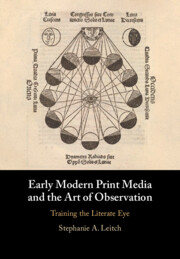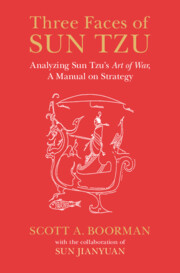252 results
Chapter 23 - Great Games
- from Part IV - Anxious Neighbourhoods, Uncertain Futures
-
-
- Book:
- Europe in British Literature and Culture
- Print publication:
- 13 June 2024, pp 369-384
-
- Chapter
- Export citation
Flexible Estimation of Policy Preferences for Witnesses in Committee Hearings
-
- Journal:
- Political Analysis , First View
- Published online by Cambridge University Press:
- 09 May 2024, pp. 1-17
-
- Article
-
- You have access
- Open access
- HTML
- Export citation
The Nascence of Clay Minerals
-
- Journal:
- Clays and Clay Minerals / Volume 33 / Issue 3 / June 1985
- Published online by Cambridge University Press:
- 02 April 2024, pp. 161-172
-
- Article
- Export citation
17 - Information Intermediaries and AI
- from Part II - Property
-
-
- Book:
- The Cambridge Handbook of Private Law and Artificial Intelligence
- Published online:
- 21 March 2024
- Print publication:
- 28 March 2024, pp 384-406
-
- Chapter
- Export citation

Early Modern Print Media and the Art of Observation
- Training the Literate Eye
-
- Published online:
- 14 March 2024
- Print publication:
- 04 April 2024
4 - Move 4: Explore Consequences
-
- Book:
- Sorting It Out
- Published online:
- 18 January 2024
- Print publication:
- 29 February 2024, pp 113-148
-
- Chapter
- Export citation
Introduction
-
- Book:
- Three Faces of Sun Tzu
- Published online:
- 07 March 2024
- Print publication:
- 15 February 2024, pp 1-22
-
- Chapter
- Export citation
5 - Reflexivity
-
- Book:
- The Logic of Entailment and its History
- Published online:
- 08 February 2024
- Print publication:
- 15 February 2024, pp 96-116
-
- Chapter
- Export citation
F - Strategist Should Have an Accurate Grasp of the Significant Information
-
- Book:
- Three Faces of Sun Tzu
- Published online:
- 07 March 2024
- Print publication:
- 15 February 2024, pp 357-422
-
- Chapter
- Export citation

Three Faces of Sun Tzu
- Analyzing Sun Tzu's Art of War, A Manual on Strategy
-
- Published online:
- 07 March 2024
- Print publication:
- 15 February 2024
Chapter 12 - Knowledge and Disinformation
- from Part III - Theoretical Upshots
-
- Book:
- Resistance to Evidence
- Published online:
- 16 February 2024
- Print publication:
- 15 February 2024, pp 178-191
-
- Chapter
-
- You have access
- Open access
- HTML
- Export citation
Introduction
-
- Book:
- Three Faces of Sun Tzu
- Published online:
- 07 March 2024
- Print publication:
- 15 February 2024, pp 1-22
-
- Chapter
- Export citation
F - Strategist Should Have an Accurate Grasp of the Significant Information
-
- Book:
- Three Faces of Sun Tzu
- Published online:
- 07 March 2024
- Print publication:
- 15 February 2024, pp 357-422
-
- Chapter
- Export citation
11 - Patents and Competition
- from Part V - Patent Enforcement, Wireless Markets, and Global Competitiveness
-
-
- Book:
- 5G and Beyond
- Published online:
- 14 December 2023
- Print publication:
- 21 December 2023, pp 242-262
-
- Chapter
-
- You have access
- Open access
- HTML
- Export citation
Introduction to Part 2: What Do We Mean by Contexts in Public Health?
- from Part 2 - Contexts for Public Health Practice
-
-
- Book:
- Essential Public Health
- Published online:
- 01 December 2023
- Print publication:
- 14 December 2023, pp 204-208
-
- Chapter
- Export citation
WRITERS, RASCALS AND REBELS: INFORMATION WARS IN THE RES GESTAE OF AMMIANUS MARCELLINUS
-
- Journal:
- The Classical Quarterly / Volume 73 / Issue 2 / December 2023
- Published online by Cambridge University Press:
- 22 January 2024, pp. 898-915
- Print publication:
- December 2023
-
- Article
-
- You have access
- Open access
- HTML
- Export citation
6 - Quotidian Care
-
- Book:
- Caring for Cultural Heritage
- Published online:
- 09 November 2023
- Print publication:
- 23 November 2023, pp 180-208
-
- Chapter
- Export citation
Inaccurate forecasting of a randomized controlled trial
-
- Journal:
- Journal of Experimental Political Science , First View
- Published online by Cambridge University Press:
- 22 November 2023, pp. 1-17
-
- Article
-
- You have access
- Open access
- HTML
- Export citation
8 - Advocacy Strategies with Regulators
-
- Book:
- Strategy Beyond Markets
- Published online:
- 02 November 2023
- Print publication:
- 16 November 2023, pp 101-114
-
- Chapter
- Export citation
Are popular books about diet and health written based on scientific evidence? A comparison of citations between the USA and Japan
-
- Journal:
- Public Health Nutrition / Volume 26 / Issue 12 / December 2023
- Published online by Cambridge University Press:
- 13 November 2023, pp. 2815-2825
-
- Article
-
- You have access
- Open access
- HTML
- Export citation



